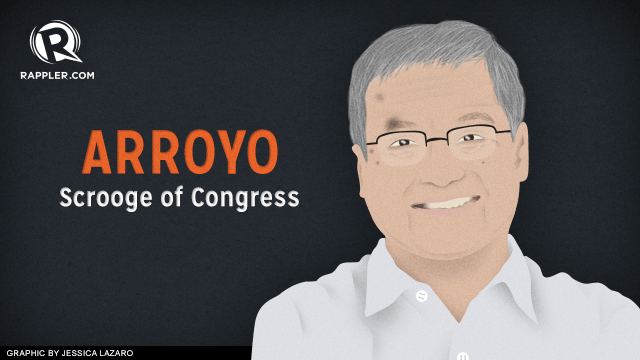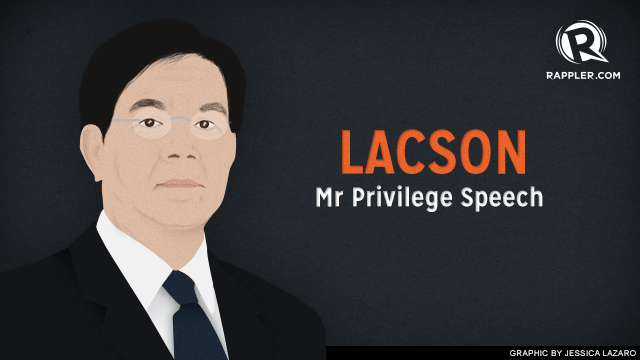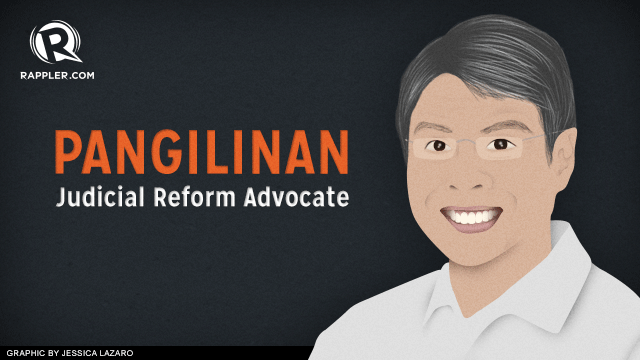SUMMARY
This is AI generated summarization, which may have errors. For context, always refer to the full article.

MANILA, Philippines – As the Senate prepares to welcome its newest and youngest members, it will also bid good-bye to 5 lawmakers known as legal luminaries, top businessmen, and even one self-styled “fugitive from injustice.”
This week’s adjournment of session of the 15th Congress marks a changing of the guards in a chamber that is home to the so-called 24 independent republics.
The graduating senators – Edgardo Angara, Joker Arroyo, Panfilo Lacson, Francis Pangilinan and Manny Villar – will end their 2nd consecutive terms on June 30, with this session week being their last.
The 5 form a unique mix of experience, expertise and controversy. The group is composed of 3 lawyers (Angara, Arroyo, Pangilinan), two former Senate Presidents (Angara and Villar), two almost-presidents (Lacson and Villar), and two future president’s men (Lacson and Pangilinan).
Arroyo and Villar – both former congressmen – made history for their roles in the Estrada and Corona impeachment trials. Angara and Villar’s names will endure in the Senate, with their relatives joining the new Congress.
As the senators end at least 12 years of legislation, Rappler takes a look at their performance, contributions and what’s next for them after they leave the Senate halls.
What legacy are they leaving behind?

With 4 Senate terms spanning 1987 to 1998 and 2001 to 2013, Angara is the longest serving senator since the EDSA People Power Revolution. Known by his initials, SEJA is credited for landmark laws that cover his wide-ranging interests.
Initially focused on education, the former University of the Philippines president later filed bills on health, food and agriculture, arts and culture, and financial reform.
He is retiring as head of the Committees on Education, Science and Technology, and the Congressional Commission on Science and Technology and Engineering.
The founding partner of the ACCRA law firm authored laws including the Free High School Act, and those creating the Commission on Higher Education (CHED), the Technical Education and Skills Development Authority (TESDA), the Philippine Health Insurance Corporation (Philhealth), the National Museum, and the National Commission on Culture and the Arts (NCCA).
Angara also authored the Senior Citizens Act, Magna Carta for Public Health Workers, Procurement Reform Act, Ombudsman Law, Anti-Money Laundering Act, Pag-Ibig Fund Charter, and the Pre-Need Code.
Marilen Dañguilan, a medical doctor who worked under Angara in the technical staff of the Committee on Health, said the senator was thorough in crafting bills.
“He told the staff to always put a good explanatory note. He said, ‘I don’t like one-pagers, summaries. I want you to explain why we are filing the bill, what it will do to the people.’ We came up with evidence-based explanatory notes. They call it the Angara Method. He’s scientific in his approach. He reads, he thinks, he analyzes,” she said.
Dañguilan added, “The difference with SEJA is we went deep. We did not go for superficial changes like the number of hospitals to be built. We went for deeper, structural changes like Philhealth, the Generics Act, Breastfeeding Act.”
SEJA was Senate President from 1993 to 1995. He then initiated the creation of the Legislative-Executive Development Advisory Council (LEDAC), calling it an agenda-setting mechanism between Malacañang and Congress to avoid gridlock.
Angara, 78, took part in historic Senate decisions: voting to retain the US bases, convict former Chief Justice Renato Corona, and pass the Reproductive Health (RH) and sin tax laws. Always the first to cast his vote, he once lamented that voting should not be done alphabetically.
Angara, the astute politician, also extended his reach beyond the Senate. The chairman of the Laban ng Demokratikong Pilipino (LDP) was the running mate of former president Joseph Estrada in 1998 but lost. Estrada later appointed him Agriculture Secretary and Executive Secretary until his ouster in 2001.
Yet Angara’s long tenure as a legislator also became controversial.
His law that created the Aurora Pacific Economic Zone and Freeport (APECO) is the subject of a Supreme Court case, with farmers, fishermen and militant groups saying it violates provisions on agrarian reform and social justice.
Angara responded, “For the first time, Aurora would provide a gateway to the Pacific….We are unlocking the potential of almost one million hectares of land and sea…. No one in Aurora of serious and credible reputation opposes APECO. Those opposing APECO are all from the outside.”
The senator also drew flak for the Cybercrime Prevention Act, which various sectors criticized for being excessive. The law’s author and sponsor admitted that the measure needs to be amended, saying, “Not all the laws that we pass are perfect.”
After foregoing his bid for Aurora governor, the retiring senator plans to focus on his international commitments, being chairman of the Global Organization of Parliamentarians Against Corruption (GOPAC).
His son and namesake, Aurora Rep Juan Edgardo “Sonny” Angara, is however poised to take his seat.
The elder Angara said in media interviews, “There are always unmet needs and goals that one always leaves, and it is the younger generation that can take on the advocacies that I have started.”

Besides his colorful first name, Sen Joker Arroyo earned a moniker in his 21 years as lawmaker: Scrooge of Congress. Never traveling abroad on government money, Arroyo is hailed as the thriftiest legislator.
While his colleagues have teams of over 10 people, he maintained a 3-member staff. Reporters recall the times he wrote his own press releases by hand as congressman, and went through his own mail and sent handwritten replies.
At the height of the Senate fund controversy, Arroyo said, “I do not spend even half of [the P2.2 million monthly] for my office expenses. This is something that I am proud of in my years of public service, in the same way that I am happy about my perfect attendance.”
Before becoming a tight-fisted member of Congress, Arroyo already made a name as a human rights lawyer and freedom fighter during the Martial Law years. He challenged the constitutionality of the proclamation imposing Martial Law, and defended political detainees like Ninoy Aquino.
After becoming executive secretary of Cory Aquino, Arroyo went on to be congressman of Makati for 9 years. It was in the House of Representatives where the now 86-year-old Arroyo began his role as fiscalizer.
A 2001 Newsbreak article described then Congressman Arroyo: “He opposed the death penalty, the sale of Petron, and the oil-industry deregulation law, among others. Opposing is his favorite past-time.”
Even before the C5 controversy involving Sen Manny Villar exploded in the Senate, Rep Arroyo already delivered a privilege speech criticizing Villar for conflict of interest back in 1998. Later the two would be part of what was known as the “Wednesday Group” that included senators Francis Pangilinan and Ralph Recto.
Yet what thrust Joker Arroyo further into the national limelight was the Estrada impeachment trial, where he was lead prosecutor.
He famously thundered, “We cannot have a nation run by a thief!”
Arroyo then joined the Senate for two terms. He used to hold committee chairmanships but no longer leads any committees.
Ever the dissident, he was the lone senator who disapproved the 2013 budget. Arroyo said the Malacañang, House and Senate versions looked like “Xerox copies.” “Aren’t we expected to scrutinize and if need be, make changes thereon?”
His laws include the abolition of the death penalty, the Legal Assistance Act, and the International Convention on Civil Liability for Oil Pollution Damage.
The lawmaker though was criticized for his ties with former President Gloria Macapagal-Arroyo. In 2007, he ran under her Team Unity, saying the Genuine Opposition failed to denounce violent means of overthrowing the government.
In Senate probes on the Arroyo administration, the senator was perceived to defend her administration. He also turned into a staunch critic of the Aquino government, once comparing it to a student council.
Sen Arroyo blasted President Benigno Aquino III for pushing for Corona’s impeachment and conviction. He was one of only 3 senators who voted for acquittal.
“This is not justice, political or legal, this is certainly not law, for sure it is not the law of the Constitution. This is only naked power as it was in 1972. I have not thought that I would see it again so brazenly performed,” he explained his vote.
Arroyo also voted against the sin tax law, opposing the lump sum appropriation. Yet he was in favor of the RH law.
Senate President Juan Ponce Enrile said of him, “Sen Joker Arroyo is the only member of the Minority who really and actually acts as a member of the Minority, doing his job at fiscalizing even more than the Minority Floor Leader.”

Sen Panfilo “Ping” Lacson describes himself as a no-nonsense politician. Yet the former police chief also has a flair for the dramatic.
The senator known for his exposés and explosive privilege speeches lambasted former President Joseph Estrada in a 2009 speech titled, “Ang Dalawang Mukha ng Sining” (The Two Faces of the Arts). In that speech, Lacson castigated the former actor for condoning the illegal numbers game jueteng.
Lacson’s oration went, “May dalawang mukha nga ba ang sining? O sa likod ng puting tabing ay ibang hitsura ng mukha ang nakatago?” (Do the arts really have two faces or is there another face behind the silver screen?) He said he would tell his close friends, “Anak ng jueteng na buhay ito!”
Lacson took the Senate floor countless times to expose supposed anomalies, especially those involving the Arroyo administration: Jose Pidal, Hello Garci, the NBN-ZTE broadband deal, and the fertilizer fund scam.
It was no surprise for the former police director general, who sought to change his image from crime fighter to graft buster.
“I did not have to seek out most of the anomalies. They came to me. The easiest and most convenient thing to do was to ignore them. I won’t have enemies and my life will be peaceful but that would be betraying my oath to the Filipino people,” he said.
In the Senate, Lacson said he was consistent with his “no-take” policy in the Philippine National Police by refusing the P200 million pork barrel given to each senator yearly. He called for its abolition, saying it is the source of corruption.
He was also vocal during the Senate fund controversy, getting embroiled in a word war with Sen Miriam Defensor Santiago. Santiago called Lacson Enrile’s attack dog and even questioned his sexuality. Lacson fired back that she is a “crusading crook” and vowed to expose her own misuse of Senate funds.
Lacson heads the Committees on Accounts, and National Defense and Security. His major laws include the Anti-Money Laundering Control Act, Alternative Youth Course, Anti-Human Trafficking Act, Customs Brokers Act, and Anti-Red Tape Act.
The Aquino ally voted to convict Corona, and to pass the RH and sin tax laws. Lacson was a co-author of the RH law.
Lacson also harbored ambitions for Malacañang. He ran for president in 2004, finishing 3rd next to Arroyo and Fernando Poe Jr. He resigned from the LDP after Angara endorsed Poe.
He again eyed the presidency in 2010 but withdrew his candidacy, citing financial constraints. Yet observers noted that Lacson backed out a day after former police officer Cezar Mancao returned to the Philippines. Mancao implicated Lacson as mastermind of the murder of publicist Bubby Dacer and his driver Emmanuel Corbito in 2000.
It was this double murder case that drove Lacson to make his most audacious Senate move – a one-year disappearing act. Shortly before the Court of Appeals issued an arrest warrant against him, Lacson fled the Philippines, only surfacing 13 months later, when the court cleared him.
His flight was tagged as a case of the lawmaker being the lawbreaker. Lacson cried persecution.
“It was made inevitable the moment I was informed by DOJ contacts that prosecutors were allowed to shred the rules on evidence in favor of satisfying a last-ditch effort of an unelected and corrupt regime of Gloria Macapagal-Arroyo to put me away for long good years of my life,” he said upon his return.
The Supreme Court eventually cleared him in the case, and in the alleged rubout of Kuratong Baleleng gang members in 1995.
Now free from the legal quagmire, Lacson, 65, is about to join the Aquino Cabinet, with the President confirming that he offered him a post.
Lacson said in March, “It’s not an existing position. It’s going to be exciting and I’ll create more enemies.”

Even before the Corona trial, Sen Francis “Kiko” Pangilinan called attention to reforms needed in the judiciary.
As former Justice Committee chairman, Pangilinan was a member of the Judicial and Bar Council (JBC).
In 2002, he proposed that interviews of candidates for judicial posts be open to the public. During the search for Corona’s replacement, he said the JBC should go a step farther, also opening its meetings, debates and voting to avoid lobbying.
“When you open it up to the public then you somehow ventilate it publicly and people can formulate their own opinions on the basis of the information but without the right information, they start saying, ‘Oh maybe someone paid somebody,’” Pangilian told Rappler in a 2012 interview.
In 2007, Pangilinan proposed the creation of the Judicial, Executive and Legislative Advisory and Consultative Council (JELACC) to discuss budgetary assistance to the judiciary. It convened several times but not yet under the Aquino administration.
The senator’s interest in the judiciary follows a career as a legal analyst in media, law teacher, and human rights lawyer. He started out as a student-activist in the University of the Philippines, and became Quezon City councilor.
In the Senate, Pangilinan authored the Judiciary Compensation and Modernization Act, the law Strengthening and Rationalizing the National Prosecution Service, Alternative Dispute Resolution Act, Anti-Domestic Violence Act, Legal Assistance Act, UP Charter, and the Judiciary Retirement Benefits Act.
Besides law and the courts, Pangilinan also pushed for agriculture modernization as current chairman of the Committee on Agriculture and Food. He also heads the Committee on Social Justice, Welfare and Rural Development.
Last year, he led his committee’s probe into alleged rice smuggling at the Subic Freeport. A farm owner, Pangilinan also authored the Meat Inspection Code, and launched an agriculture and food security project called Sagip Saka.
The senator also focused on youth concerns, starting the Ten Accomplished Youth Organizations (TAYO) Awards with the National Youth Commission in 2002.
A member of the ruling Liberal Party, Pangilinan supported administration-backed initiatives like the conviction of Corona, and the RH and sin tax laws.
Despite his contributions, the senator was ridiculed as “Mr Noted” for merely replying “noted” to opposition requests to scrutinize election returns as a member of the National Board of Canvassers in the 2004 presidential race.
In 2011, Sen Vicente “Tito” Sotto III criticized Pangilinan for belatedly calling for a probe into allegations former President Arroyo cheated in 2004. Pangilinan responded that he only acted “on the basis of the evidence available.”
“In 2004, we did not know about Hello Garci but when we learned about the taped conversations in 2005, out of principle, we did not hesitate to condemn the acts then and called for her immediate resignation.”
“In keeping with this principled position, we refused a slot in the administration ticket in 2007 and opted to run as an independent,” added Pangilinan who later became an Arroyo critic.
The senator was majority leader in the 12th and 14th Congress. He sought the Senate presidency in 2010 but withdrew his bid after failing to secure the 13 votes needed for the post. Enrile emerged as the leader of the 15th Congress.
At 49, Pangilinan is the youngest of the 5 retiring senators. He will likely stay in government, with Aquino offering him a Cabinet post. The President hinted it will be related to agriculture.
Pangilinan is not keen on replacing the agriculture chief. “Secretary [Proceso] Alcala’s job is also good and our tandem is great. He is Batman and I’m Robin.”

“I just want to become irrelevant,” declared Sen Manuel “Manny” Villar Jr in a 2012 Rappler interview, his first tell-all since he lost the presidency in 2010.
Yet months later, Villar showed he still holds sway not just in business but in politics as well. As president of the Nacionalista Party (NP), Villar led the party in forging a partnership with ex-rival President Benigno Aquino III’s Liberal Party for the May 13 midterm polls. The two allied to form the administration slate Team PNoy, even after a bruising presidential contest in 2010. Villar accused Aquino’s handlers of being behind attacks that cast doubt on claims he grew up in a poor family.
The senator was also key in Sen Franklin Drilon’s bid for the Senate presidency in the 16th Congress, agreeing to field a common candidate with the LP.
Villar held that same post from 2006 to 2008, the first post-war official to become both House Speaker and Senate President.
Known for his rags-to-riches story, the so-called brown taipan emerged to be a real estate magnate, leading Vista Land that offers low-cost housing. He joined politics as congressman of Las Piñas and Muntinlupa from 1992 to 2001.
As House Speaker, Villar led the impeachment of then President Joseph Estrada, the first for a Philippine chief executive. After the prayer, he read a resolution approving the impeachment, bypassing a vote and ignoring attempts of Estrada allies to delay it.
Running as an independent allied with the People Power Coalition, Villar won his first Senate term in 2001. He was re-elected in 2007 under the Genuine Opposition.
Villar focused on entrepreneurship, housing and OFWs. He is chairman of the Committees on Economic Affairs, and Trade and Commerce.
He authored laws including the Barangay Micro Business Enterprises Act, Overseas Absentee Voting Act, An Act Granting Benefits and Privileges to Senior Citizens, Intellectual Property Code, Magna Carta for Micro, Small and Medium Enterprises, and the Anti-Terrorism Act.
Villar was front and center of congressional drama when he was forced to resign as Senate President after losing the support of the majority over the C5 road extension project.
The Senate Committee of the Whole led by his successor Enrile recommended his censure for supposedly using his influence so the road will pass through his real estate properties.
He was also accused of a double insertion in the budget for the C5 project. Villar boycotted the investigation, saying some panel members were his rivals in the presidential race.
Still, the issues continued to hound him in the campaign, along with questions about his dirt poor origins, and allegations that he was Arroyo’s secret candidate. After finishing 3rd and conceding the polls, Villar kept a low-profile.
Yet while delivering his verdict on Corona two years later, Villar surprised spectators by suddenly addressing the issues raised against him in the campaign.
“I remember that happened to me, too. So many lies were hurled against me. There is C5 and Daang Hari Road that millions of Filipinos use. I did not benefit from that. They said I’m ‘Villaroyo.’ What a big lie. My wife voted for her impeachment; the NP campaigned to impeach her. I led the investigation on jueteng against President Arroyo.”
In the end, Villar still voted to convict Corona. He also voted to pass the sin tax law but rejected the RH law.
After his loss, Villar bounced back as he focused on his business. He already recovered the estimated P2 billion he spent on his campaign. He is the richest senator, with a net worth of P1.45 billion in 2012.
Villar, 63, plans to devote more time to the Villar Foundation and to helping his children run the family business when he leaves the Senate. He is considering taking over as chairman of Vista Land.
His wife, former Las Piñas Rep Cynthia Villar, seeks to continue his work, vowing to re-file his bills like that creating a Department of Overseas Filipino Workers.
Of politics, he said, “What else will I do? I’ve experienced being Speaker, Senate President and a presidentiable. Perhaps it’s destiny and to be fair with our President, he probably would not have really planned for it and it’s his destiny. I can respect that.” – Rappler.com
Add a comment
How does this make you feel?
There are no comments yet. Add your comment to start the conversation.